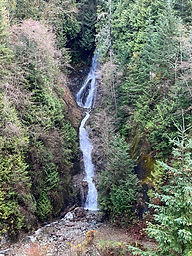Blackberry Battles
- kc dyer
- Sep 6, 2024
- 2 min read
Invasive species thrives in West Coast climate

If you live in or around Sea to Sky country, you'll recognize this particular berry, as it lurks around just about every corner. But did you know that not only is the Himalayan blackberry not native to this region, but is considered an invasive species?
At the peak of ripeness right about now, the Rubus armeniacus are a tartly sweet treat for local bears and any human brave enough to reach past the killer thorns. They are occasionally confused with the black raspberry (Rubus leucodermis) or the trailing blackberry (Rubus ursinus), both of which are native to the region, and good substitutes if you are looking for native plants to populate your garden.
Originally found in the mountains of Armenia and Iran, the Himalayan blackberry came to North America in the 1880s and has only found its home in coastal BC since the 1970s. It spreads via its plentiful seeds, but also can send out roots when a stem touches the ground, and thrives in damp conditions. The biggest problem is its ability to push out native plants, reducing natural biodiversity, blocking streams from local animals and protecting itself with lethal thorns up to a centimetre in length.

The plants are considered such a concern that the Sea to Sky Invasive Species Council (SSISC) has marked them for complete eradication in both Pemberton and Whistler.
The SSISC invites gardeners to report and remove Himalayan blackberry bushes, and advises not to place discarded plant debris in your compost. And if you're looking for a natural way to remove these bushes from your back garden, the SSISC notes that once an area has been mechanically cleared, "grazing by goats is considered effective", and chickens are very good at removing seeds from the area.
In the absence of goats, here at The Watershed, we are partial to a little blackberry jam.

The Watershed values your thoughts. Leave your comments below, or email us at editor@lionsbaywatershed.ca
Like what you're reading? For as little as $5/month, you can support local independent journalism by subscribing to The Watershed HERE.


Comments